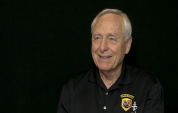7:10 | The officers club at Udorn was a lively place and even led to the writing of a book, remembers F-4 pilot Ron Schuh. His first stop back home after his first tour was Chicago in the dead of winter, quite a change from the tropics. The hot climate made the pilots dislike a new flame retardant flight suit, until it kept someone from getting seriously injured.
Keywords : Ron Schuh Vietnam pilot McDonnell Douglas F-4 Phantom Forward Air Controller (FAC) Fast FAC air strike reconnaissance (RECON) officers club Easter Offensive MiG tropics Chicago IL winter Lake Michigan Nomex flame-resistant Laos bail out parachute (chute) streamer Roger Locher Angel's Truck Stop: A Woman’s Love Laughter and Loss during the Vietnam War Angel Pilato

Ron Schuh always wanted to be a fighter pilot. Nothing else would do. He thought he had an appointment to the Air Force Academy, but that didn't work out so Air Force ROTC was the starting point for him.
Commissioned out of Air Force ROTC in 1967, Ron Schuh was assigned to fly the F-4 Phantom. He was lucky to get the new F-4E model which had an internal rotating gun, something that was left out of the early models because, "The Air Force doesn't dogfight, anymore." Guess again! They were tangling with MIG's over Vietnam.
When new F-4 Phantom pilot Ron Schuh got to his base in Thailand, he quickly found out that he knew nothing. On an early mission, he asked his crew mate what were those white puffy things? They're shooting at us! That was the first time he saw ground fire. He became part of a new program which used F-4's as a Forward Air Controller platform. It was too dangerous over North Vietnam for the small unarmed aircraft.
F-4 pilot Ron Schuh was either working air strikes or flying low looking for targets of opportunity. He took hits from AK-47's and every kind of anti-aircraft fire. There were a lot of close calls but he was never shot down. He did suffer weight loss from the stress and the environment until he was almost grounded.
F-4 pilot Ron Schuh recounts two missions from his first tour in Vietnam, one of which earned him a Silver Star. In that one, his job was to mark targets with smoke and he went back repeatedly in the face of fierce ground fire. In the other, he decided to stage a surprise strafing run on a Pathet Lao ping pong game.
It started in the bar at Udorn. A group of pilots listened to a CIA operative describe a problem the Hmong army was having in Laos, mainly too many North Vietnamese troops. They came up with a plan to hit their camp with wave after wave of cluster bombs.
It was an intense three day search and rescue operation. A downed American pilot survived by crawling into a river bank, remembers F-4 pilot Ron Schuh. His own missions carried a high risk of being shot down. He describes one in which the radio was crackling with three emergency situations, all happening at the same time.
The first few months after his first Vietnam tour were great, remembers F-4 pilot Ron Schuh. It was a big party while undergoing further training. After a practice bombing run, the commander wanted to know why the formation was so ragged. The answer startled him.
You were supposed to get your choice of assignments during a second tour. That's what F-4 pilot Ron Schuh kept telling the sergeant on the other end of the phone. He finally got his assignment to Thailand, but it wasn't his old squadron, so he figured out a way to get there. The wing commander at the time was not very good so the guys harassed him.
Ron Schuh kept a tape recorder in the cockpit of his F-4 and it was only recently that he digitized the tapes and began to relive his missions over Southeast Asia. One of them was air support for the Son Tay raid, which failed to find the POW's to be rescued.
Ron Schuh was based in Thailand, where he flew F-4 Phantoms in missions over the whole of Southeast Asia. He tells the story of the visit of legendary fighter pilot Robin Olds to his base. A good time was had by all, and the renowned ace even saved Ron's hide in a briefing.
Ron Schuh served two tours in the skies over Southeast Asia and he has some pointed words of advice for our political leaders. He says we learned from our lessons in Vietnam for a while, but we have slipped back into a strategic dysfunction. He remembers a mission briefing which exposed a major shortcoming, the training for combat.